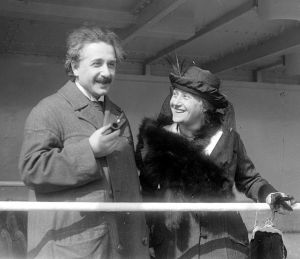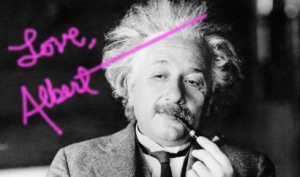“Lasting harmony with a woman [was] an undertaking in which I twice failed rather disgracefully.” – Albert Einstein

Photo by Arthur Sasse taken in March of 1951 on Einstein’s 72nd birthday. Fed up by having to smile all day, Einstein demonstrated one of the keys to resilience, having a sense of humor.
By his own confession Professor Einstein wasn’t so good with the ladies. So why in the world would we consult with him (one of the greatest minds ever) to discover lessons for love? After all, he married his cousin. While recently browsing through his repertoire of thoughts and writing, we wondered… had he applied his own philosophy (and his creative thinking) to his relationships, would he have had more success? He has thousands of wonderful quotes, so narrowing them down was challenging. Perhaps this will be part one of Einstein’s Guide to Love (remixed by Duct Tape and Bubblegum).
The following eight quotes by Albert Einstein are taken out of context, and explored in the context of finding love and keeping it.
1) Gravitation is not responsible for people falling in love.
There’s a bit of wisdom in this joke– humans can find all sorts of mysterious explanations for falling in love. Sigmund Freud described falling love as a form of psychosis! Some people fall in love with strangers and project all of their lifelong fantasies onto them. They go on a couple of dates, become shocked that the person’s favorite color is blue (when their fantasy was that it was red), feel disappointed and cannot figure out why that person is not interested in them. With too many preconceived ideas, you can’t actually fall in love with someone for who they truly are. The gravity of your projections caused you to “fall in love,” but with who? Yourself? It’s like the story of the stage hypnotist who hypnotized some of his male audience members to fall obsessively in love with a rag doll. The men begged it to marry them, fought over it and eventually began fondling the doll– his point: don’t hump the rag doll. Don’t get lost in your mysterious projections and date your mental fantasy (or ladies, don’t pick out the napkin colors for the wedding on the first date). Get curious about the person you’re with and know the actual source for your falling in love. Is it gravity? No. Is it your projections? Probably. Once you discover that it’s projection, then get curious about why and what you’re projecting? Are you lonely? Are you narcissistic enough that you can’t tolerate a person with different beliefs? Are you afraid to get hurt? Get curious about how you fall in love and understand why the other person fell in love with you. Sure, there is some mystery to it, but if they only fell in love with you for your hot ass, while you thought they loved you for your scientific discoveries, then the relationship never started on solid footing. It started with the puppet show.
2) Put your hand on a hot stove for a minute, and it seems like an hour. Sit with a pretty girl for an hour, and it seems like a minute. THAT’S relativity.
This is an extension of the first lesson. Don’t project. Now take it a step further: your experience is relative. Just like one’s perception of time is relative, your perception of yourself, other people and your relationship is relative. With this relativity in mind, try to understand the other person’s perception in an authentic way so that you’re not experiencing a hot stove while they’re experiencing a pretty girl.
3) The true value of a human being is determined primarily by the measure and the sense in which he has attained liberation from the self.

Did Elsa ever nag him and say?: “Albert, you cannot go out of the house in those shorts!!” Photo by Reginald Donahue. Courtesy of the Southold Historical Society, Southold, N.Y.
Getting into deeper aspects of lasting relationships, most of us find some way to bitch about something our partner does, or doesn’t do. We do this for a lot of reasons. Perhaps the reason is because we have pent up resentments? Perhaps we have unprocessed trauma from previous times in our life? Some people have been hurt by someone else and fear that they will be hurt again. This fear-based relating is actually a relationship with self, resulting from carrying memories and feelings about the past into the present. We are relating to our internal experience (our own attack thoughts) and not actually relating to the other person. We might think that other people are out to get us, but maybe, just maybe (based on our preconceived beliefs and our victimized self belief), we actually choose people who hurt us– because we expect it! We compress our anger about being victims, we disown it and we unwittingly project it onto the other person who lashes out at us and then we claim that they are cruel to us. Yes, they may have acted out their anger (which wasn’t a good idea) but we helped elicit if from them. In a relationship, we need to find liberation from ourselves so that we can relate to another person in a whole way.
4) The value of a man resides in what he gives and not in what he is capable receiving.
Let’s just get this out of the way first: No, we don’t advocate that you become a give-til-you-drop, pathological doormat, or punching bag for another person. Moving on. Generosity is critical in any relationship: generosity of time, generosity of commitment, generosity of communication, generosity of spirit, generosity of emotional and physical connection, to name just a few. Relationships require that we are able to give to another person and that that giving is reciprocated. Einstein’s statement implies the highest, most saintly of human spiritual attainments, but we’re only human and maybe this explains some of his relational difficulties.We also believe that relationally speaking, receiving is important. Receiving can be of equal value at many times, especially receiving love. If we cannot take in another person’s love, affection and gifts, they will take them elsewhere, because few people are foolish enough to keep on giving to a person who is unable to receive. In our receiving expressions of love from another person, even with something as simple as a “Thank you” for a compliment, we are giving to them by implicitly saying, “I value your love.”
5) Once you can accept the universe as matter expanding into nothing that is something, wearing stripes with plaid comes easy.
We love Einstein’s sense of humor. Having a sense of humor is the key to emotional resilience, and it can be the key to difficult times in life and relationships. On another note — Wow! What kind of consciousness can accept matter expanding into nothing that is something? It’s important to sincerely understand another person’s world view in order to get along with them. It would have been hard to have a sincere understanding and empathy for Einstein’s world view, given how utterly different it was. Can you imagine an argument in the Einstein household:
Elsa: Albert, you cannot go out of the house in that mismatched outfit!
Albert: Elsa, who cares if I wear plaid with stripes!? The universe is matter expanding into nothing that is something!
Elsa: (throws her arms up in the air in discouragement)
It’s common that we try to change our partners and nit pick the little things. But when we attempt this, it’s important to also recognize the big picture– your relationship. In the Einstein big picture, most human trifles are silly. Remember the long view of your relationship and the profound value of the person you’re with.
6) People like us, who believe in physics, know that the distinction between past, present, and future is only a stubbornly persistent illusion.
If you can get this concept, then you’re enlightened and we want to hire you to write this blog for us. For the rest of us, we get little glimpses of it here and there. This is another perspective on the concept of projection. When we cling to long held resentments about something in the past, we have a tendency to project them onto the present. When we have expectations, we project them onto the future. When do we live in the here and now? What is the present moment in our relationship? The stubbornly persistent illusion of past, present and future shapes our relationships. The he-said-she-said (or he-said-he-said, etc.) debate goes on and on and it usually circulates around an issue from the past, or an expectation about the future… But you did blah blah blah to me (past) and I can’t forgive you. When are you going to (future) get it together and change your plaid pants? Sure, sometimes your partner needs to change their behavior, but you’re not going to be the one to change it– they are, and like the rest of us, they’re going to do it in their own sweet time. Yes, something from the past may have been awful but harboring it now (and not releasing) is only effecting the well being of your relationship today. If we can find a way to drop the past/present/future illusion, we might just be able to bring a solution to the present, which brings us to the next lesson about insanity.
7) Insanity: doing the same thing over and over again and expecting different results.
This is a well known quote, and it sure is true. In Julie’s work, she sees person after person, and couple after couple, doing the same thing over and over in their relationship and hoping for different results (though she never thinks they’re insane, only human). The problem is, “if all you have is a hammer, you think everything is a nail.” We need to change our perspective on ourselves, our partner and the situation. We need to change it up and try something new. If sex is not working, for example, and you’ve been worrying and complaining about it for ages, then begin by stopping the complaints (both in your thinking and to your partner). Do something different. Read a book on sexuality (we like this one), go to a sex therapist, try a self help group, try some contrary action in your relationship… For example, if you always reject your partner, then be the one to initiate. Try talking about it with your partner from a new angle, such as what you’re afraid of, or what you want– a longing that has been unexpressed. Another example of relationship insanity is having the same fight over and over. If you and your partner are having the same fight over and over, then we’re sorry to say: you both want to be stuck in that and are afraid to change. If you’re expecting different results, after the tenth replica fight, then heed Einstein’s words. Try having the conversation again, but remove all references from past versions of the conversation, and keep the focus on yourself, not on what the other person has done to harm you. If you are each willing to take 100% responsibility for change, then there’s some hope.
8) There are two ways to live your life. One is as though nothing is a miracle. The other is as though everything is a miracle.
For your life, for finding love, for your relationship, choose the latter. Everything is a miracle.


Pingback: 8 Lessons from Albert Einstein on Finding Love and Keeping it | Putting Sexy Back in Votech, Vocational Education and Trades